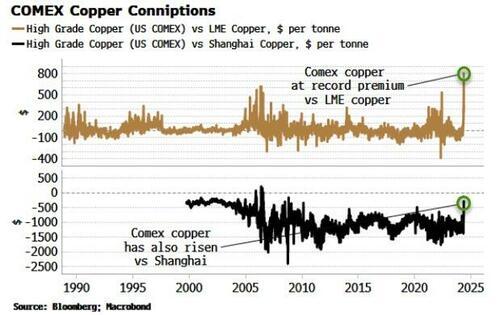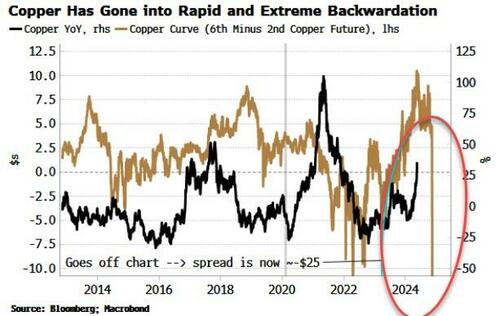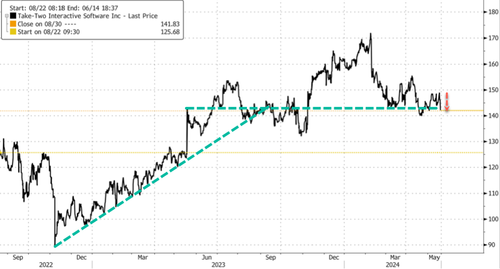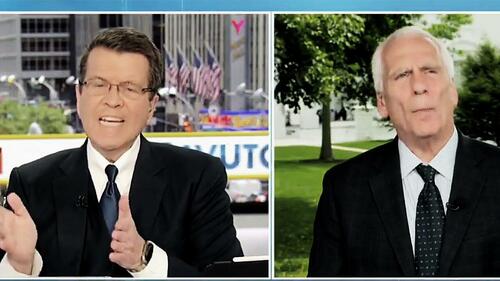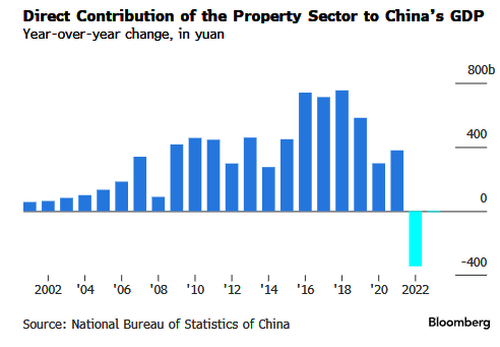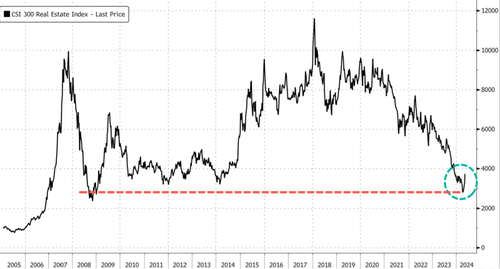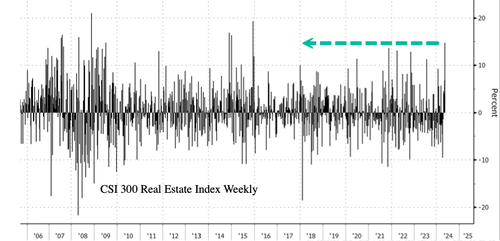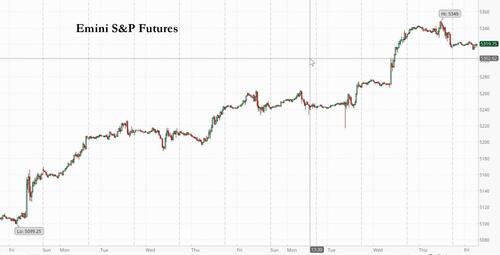One can readily admit that the Magisterium's manner of expression does not seem very easy to understand at times. It needs to be translated by preachers and catechists into a language which relates to people and to their respective cultural environments. The essential content of the Church's teaching, however, must be upheld in this process. It must not be watered down on allegedly pastoral grounds, because it communicates the revealed truth.
All
Is US Copper Sowing The Seeds Of Its Own Return To Earth?
Is US Copper Sowing The Seeds Of Its Own Return To Earth?
Tyler Durden
Fri, 05/17/2024 - 08:50
Authored by Simon White, Bloomberg macro strategist,
Copper’s recent rally has been most pronounced in the US, taking the futures curve there into extreme backwardation. That typically precedes a supply response and lower prices. Nonetheless, the long-term bullish case for copper is intact.
Copper trades in three main exchanges:
- Comex in the US,
- the London Metal Exchange and
- the Shanghai Futures Exchange.
It has risen globally in recent weeks, but the rally at Comex has eclipsed the other two.
While stocks in Shanghai have risen sharply this year, and in London they have fallen but remain well above zero, at Comex warehouses they have fallen to near zero. This has led to massive short squeeze in US copper, with the metal trading at its highest ever premium to LME copper at over $800 per tonne (and much higher on an intraday basis).
This has pushed the Comex copper futures curve into massive backwardation, i.e. spot prices trading well above futures prices.
However, this often eventually leads to a self-correction. High spot prices encourage more supply to come on to the market, depressing the spot price and normalizing the curve. Today’s level of backwardation suggests this could be more pronounced than normal.
It’s ironic this comes at a time of ultra-bullish copper calls. Even though the thesis is sound – there is likely to be huge demand for copper from AI and green capex (with plenty of global fiscal stimulus as support – there will probably be a better time to start to set longs.)
Also, as noted Thursday, copper might face medium-term headwinds from the US economy potentially looking more recessionary, although this should be taken in consideration with China’s recovery, which is finally gaining some momentum.
Take-Two Shares Drop After Grand Theft Auto VI Delayed Again
Take-Two Shares Drop After Grand Theft Auto VI Delayed Again
Tyler Durden
Fri, 05/17/2024 - 08:30
Take-Two Interactive Software fell in premarket trading in New York after lowering its fiscal 2025 bookings forecast on Thursday evening and announcing a release date for Grand Theft Auto VI in the autumn of 2025. Some Wall Street desks viewed the release date as a "delay."
Take-Two now expects fiscal 2025 bookings between $5.55 billion and $5.65 billion, down from the Bloomberg estimate of $6.92 billion.
Here's a snapshot of the 2025 outlook:
- Sees net bookings $5.55 billion to $5.65 billion, estimate $6.92 billion (Bloomberg Consensus)
- Sees adjusted EPS $2.34 to $2.59, estimate $5.86
- Sees adjusted Ebitda $746 million to $800 million, estimate $1.23 billion
Besides the outlook, Wall Street analysts focused on Take-Two's Rockstar Games release of GTA6. Some desks say this date is considered a "delay."
Morgan Stanley, Matthew Cost (overweight)
- The delay to Grand Theft Auto VI removes a "major overhang" from the shares, which Cost says had weighed on the stock since 3Q results in February
- Not surprised by limited EPS growth in the guidance, though notes management had "pointed to a significant planned increase in marketing around Zynga titles, which we would hope to see generate meaningful incremental profitability in FY26"
Raymond James, Andrew Marok (outperform)
- Results came slightly ahead of expectations, though Take-Two put the "final nail in the coffin" for expectations of Grand Theft Auto VI releasing in FY25
- "The new FY25 guide suggests seven immersive core titles: the already-released TopSpin 2K25, the dependable iterations of NBA 2K and WWE 2K, a new iteration of a sizable 2K franchises (we estimate Civilization VII), and three others (one of which we expect is PGA Tour 2K25)"
Citi, Jason Bazinet (buy)
- The Grand Theft Auto date "will place the release in FY 2026 and likely be the main driver behind today's lower FY 2025 outlook"
- "Some investors might view this latest GTA VI delay as a clearing event for the stock, limiting potential downside"
Deutsche Bank, Benjamin Soff (buy)
- While Grand Theft Auto VI has been delayed, the long-term opportunity in the stock remains intact
- Bookings outperformance during 4Q was driven by strength from NBA 2K24, Take-Two's mobile business and GTA
Bloomberg Intelligence, Nathan Naidu and Kevin Tsao
- "Take-Two's updated launch timing for Grand Theft Auto VI means its release will take place after end-fiscal 2025, overshadowing its fiscal 4Q consensus earnings beat"
- "Net bookings in fiscal 1Q ending June is expected to grow by a low-single digit, as a full quarter from new games offsets softness in the GTA franchise's multiplayer game, with likely upside from the completion of Gearbox acquisition"
Vital Knowledge
- The outlook is "downbeat" but the company is "still upbeat on sales growth over the coming years, and "this optimism should help mitigate the knee-jerk slump that will accompany the F25 guide"
Goldman's Eric Sheridan laid out the positives and negatives:
-
Positives: a) Strong in-period operating performance as FQ4 bookings and profitability exceeded the high-end of mgmt’s guide and beat GSe/Street driven by the outperformance of NBA 2K24, Zynga IAP, Red Dead Redemption, and GTA;b) GTA VI release date window narrowed to Fall 2025 (FY26, from CY25 prior) with mgmt. expectations continuing to increase around the release due to the strong performance of the franchise as GTA V exceeded 200mm lifetime units sold-in with growing engagement (audience +35% YoY in FY24); & c) Mgmt. maintained its expectation of growth in the year following the release of GTA VI with net bookings guided to positive sequential growth through FY27.
-
Negatives: a) FY25 net bookings revised meaningfully lower to $5.6bn midpoint (from $7bn+ prior) reflecting the narrowing of the release window of GTA VI (FY26) with some impact from other pipeline movements and announced cost actions; b) Meaningful reduction in the size of the pipeline (now 40 titles FY25-FY27 from prior 52 titles FY24-FY26) as TTWO refocuses its resources towards its highest potential titles and eliminated several projects; & c) FY25 Adj. unrestricted OCF guided to $(200)mm (vs. prior GSe of nearly $900mm) reflecting ongoing investments and lower net bookings.
This is not the first time analysts have feared delays.
Some gamers have been waiting a decade for GTA 6.
We’ve been waiting 10 years for GTA 6!! pic.twitter.com/Z8g6rISYXj
— Joe | GTA 6 Info (@GTASixInfo) November 8, 2023Take-Two shares have surged in recent quarters on the anticipation of the GTA 6 release. Shares have hit resistance between the $160-$170 levels. In premarket trading, shares are down 2%.
"We do feel highly confident that we'll deliver [Grand Theft Auto VI] in fall of 2025," Take-Two CEO Strauss Zelnick told video game website IGN when asked about rumors GTA 6 could be delayed into 2026.
Watch: Chief Economic Adviser Refuses To Admit Biden Is Lying About Inflation
Watch: Chief Economic Adviser Refuses To Admit Biden Is Lying About Inflation
Tyler Durden
Fri, 05/17/2024 - 08:10
Authored by Steve Watson via Modernity.news,
Joe Biden’s chief economic advisor refused to admit Thursday that the president keeps telling a huge lie by claiming that inflation was at 9 percent when he took office when it was really at 1.4 percent and shot up to 9 percent under Biden himself.
During an interview on Fox Business, host Neil Cavuto grilled Jared Bernstein, and told him directly “you’re lying,” and “just as bad” as Biden when he tried to dodge the matter.
CAVUTO: Why does Biden keep claiming inflation was 9% when he took office — when it was actually 1.4%?
BERNSTEIN: "The president talked about how concerned he was for households struggling with prices."
CAVUTO: "That's not what I asked you. Why does he keep misrepresenting… pic.twitter.com/lMaKNfeSOV
After Biden took office inflation surged to rates unseen since the early 1980s, peaking at an annual rate of 9.1 percent in June 2022, a full 17 months after he became president.
Yet, he keeps claiming it was ALREADY at 9 percent and that he inherited a weakened economy from Trump.
“Jared, why does he keep saying that?” Cavuto asked, following up “You’re the head of the Council of Economic Advisers. Do you ever whisper in his ear, ‘Mr. President, just to be technical about it, it wasn’t at 9% when you assumed office, it was 1.4%. It got as high as 9% in 2022, you brought it down from that, but it was never ever ever 9% when you came into office.’ So why does he keep saying it?”
Bernstein responded “Well, first of all, let me point out that in that very quote you played, the president talked about how concerned he was, uh, for households struggling with prices that he consistently—”
“That’s not what I asked you. That’s not what I asked you,” Cavuto interjected, again asking “Why does he keep misrepresenting this?”
“He’s making the point, uh, that that factors that caused inflation to climb to 9% were in place when he took office,” Bernstein claimed.
Credit to Cavuto, he was having none of it.
“No, that’s not what he said! He said it was at 9%… So if I can’t trust him with quoting data in real-time, why should I believe what he’s talking about now?”
“No it wasn’t — it was not at that! You’re almost as bad as he is,” Cavuto further charged when Bernstein attempted to claim that the annual inflation in 2021 was “about 9 percent.”
“Why can’t you just say, ‘It was high, it got as high as 9%’ — you’d be accurate in saying that — And we have now brought it down, or were struggling around the 3% area, but it’s better than it was,’” Cavuto continued.
“But instead to hang it on his predecessor that you inherited something that was through the roof when we were in the middle of Covid, it just seems to the American people whether you’re a Republican or a Democrat — you’re lying!” The host concluded.
Biden really seems to believe that he has rescued the economy, when in reality he’s overseen an unmitigated disaster.
* * *
Your support is crucial in helping us defeat mass censorship. Please consider donating via Locals or check out our unique merch. Follow us on X @ModernityNews.
The Name Game of the Orations
Mosaic of St John Chrysostom in Hagia Sophia, ca. 1000.In a previous post, I speculated on why the Orations in the Mass and Office are addressed mostly to the Father, sometimes to the Son, and never to the Holy Spirit. Father Nicholas Gihr comments on this convention in his magisterial 1902 tome The Holy Sacrifice of the Mass as well, and he also includes a footnote on the use of Saints’ names:
Michael P. Foleyhttp://www.blogger.com/profile/02649905848645336033noreply@blogger.com0
PBOC Unveils $42 Billion Monetary Cannon To Boost Debt-Stricken Housing Market
PBOC Unveils $42 Billion Monetary Cannon To Boost Debt-Stricken Housing Market
Tyler Durden
Fri, 05/17/2024 - 07:45
China's struggling housing market is set to receive a boost from a new nationwide program funded by the People's Bank of China to address oversupplied conditions. As a critical driver of the domestic economy, the nation's housing market has been in a multi-year slump. This latest initiative by policymakers aims to stabilize the housing market and stimulate the broader economy.
Bloomberg reports that PBoC Deputy Governor Tao Ling announced the new 300 billion yuan ($41.5 billion) nationwide program of cheap funding to allow state-owned companies to purchase unsold homes.
Ling said the funding will be directed at 21 providers, including policy banks, state-owned commercial lenders, and joint-stock banks. A rate of 1.75% will be offered. The low-cost loans have a one-year term and can be rolled over four times.
The new program powerfully signals that policymakers are pushing for property policy easing and measures to balance the supply-heavy housing market, which casts a dark cloud over the world's second-largest economy. This announcement appears to be a step in the right direction in a national-level policy.
Bloomberg first leaked the new rescue policies days earlier. We titled the note "Fiscal Bazooka: China Considers Buying Millions Of Homes To Save Property Market."
Also, on Friday, policymakers eased mortgage rules and removed the mortgage rate floors for first and second homes. PBoC also lowered the minimum downpayment ratio for first-time homebuyers to 15%. The downpayment ratio for second-home purchases was lowered to 25%.
Chinese Vice Premier He Lifeng said that authorities in cities with excess home inventories should purchase unsold properties and convert them into affordable housing. He also urged local governments to repurpose inactive land parcels held by property developers to alleviate their financial troubles.
This was a very policy-heavy week to save the debt-stricken real estate market. Data showed that property investment and new home sales in April experienced larger contractions, while housing prices slid even further.
China's ailing property sector is a drag on GDP.
Housing sales are tumbling.
And apartment and commercial property sales are sliding.
In markets, the CSI 300 Real Estate Index closed up 9%, with gains from April 24 totaling about 36%. Yet the latest gains in the property index are still 68% below the early 2018 peak.
The index's weekly gain was the most since early December 2015.
Will the intervention be enough?
Out Of Control Inflation: It Now Takes At Least $177,798 For A Family Of 4 To Live Comfortably In The US
Out Of Control Inflation: It Now Takes At Least $177,798 For A Family Of 4 To Live Comfortably In The US
Tyler Durden
Fri, 05/17/2024 - 07:20
Authored by Michael Snyder via The Economic Collapse blog,
I never imagined that we would ever see a time when it takes $177,798 for a family of four to live comfortably in the United States. Unfortunately, that day has arrived. Our leaders have been pursuing highly inflationary policies for many years, and now we have reached a point where inflation is wildly out of control. In fact, the latest wholesale inflation figure that was released on Tuesday came in much higher than expected. Sadly, this is just the beginning and we are in far more trouble than most people realize.
According to an incredibly shocking new study, most Americans do not make enough money to “live comfortably” in the highly inflationary environment that we find ourselves in today…
A recent study has revealed the incomes needed for families to live comfortably across the United States – and the stark contrast in the cost of living between states is startling.
The study revealed that in the most expensive states, families need nearly $300,000 to simply live ‘comfortably.’
The least expensive state requires about half that salary – still over $100,000.
Meanwhile, the average annual salary in the US is $59,428, or $28.34 per hour, as of May 2024.
The study determined that Massachusetts is the most expensive state.
It takes a whopping $301,184 a year for a family of four to “live comfortably” there.
The least expensive state is Mississippi.
In the Magnolia State, it only takes $177,798 a year for a family of four “to cover their expenses and maintain a satisfactory quality of life”.
This is our country now.
I feel like I have been banging my head into a wall. For more than a decade I have warned that this would happen, and now it is here.
And even more inflation is on the way…
Americans already contending with persistent and stubbornly high inflation just got more unwelcome news on Tuesday: There are more price hikes likely coming down the pike.
Wholesale inflation picked up in April to its highest rate in a year, according to Bureau of Labor Statistics data released Tuesday.
In April, inflation at the wholesale level jumped 0.5 percent in just one month…
Inflation at the wholesale level rose much more than expected in April, the latest sign that price pressures within the economy remain elevated and difficult to tame.
The Labor Department said Tuesday that its producer price index, which measures inflation at the wholesale level before it reaches consumers, rose 0.5% in April from the previous month.
If you multiply that figure by 12 months, you get 6 percent.
And of course you need to approximately double any number that the Biden administration gives us in order to come up with a figure that is anywhere close to accurate.
By now, just about everyone realizes that the rate of inflation in this country is massively understated.
For example, Joe Biden insists that the rate of inflation has been “low” for quite some time, but home prices have risen by more than 47 percent since the start of this decade…
Home prices have surged 47.1% since the start of 2020, easily outstripping the gains seen in recent decades.
That’s according to a recent analysis by ResiClub of the Case-Shiller National Home Price Index, which showed that house prices in the 1990s and 2010s grew a respective 30.1% and 44.7%.
Let’s all be honest with one another.
The truth is that we are in the midst of a raging cost of living crisis that has no end in sight.
And this should not surprise any of us. Our politicians continue to borrow and spend trillions upon trillions of dollars, and all of this borrowing and spending is extremely inflationary…
An economic specter haunts America. It’s also one that many American politicians – Republican and Democrat – say a great deal about but are reluctant to address.
The name of that shadow is the United States National Debt: what the US Treasury Department defines as “the amount of money the Federal Government has borrowed to cover the outstanding balance of expenses incurred over time.”
If you go to the Treasury’s website, you can see just how big that debt is. In mid-May, it was 34.5 trillion dollars. The pace of the growth in that debt is equally stunning. Approximately 1 trillion dollars is being added to America’s National Debt every 100 days.
Borrowing and spending another trillion dollars every 100 days is a completely and utterly insane thing to do.
We really are in the endgame.
Earlier this week, Fed Chair Jerome Powell warned that interest rates may have to stay high for an extended period of time in order to fight inflation…
Federal Reserve Chair Jerome Powell said Tuesday that “it may take longer than expected” for high interest rates to lower inflation and gave no hint that a recently slowing labor market could mean earlier rate cuts.
“We’ll need to be patient and let restrictive policy do its work,” Powell said during a session at a Foreign Bankers Association meeting in Amsterdam. “It may be that (high interest rates) take longer than expected to do its work and bring inflation down.”
So far, higher rates have not solved our cost of living crisis, and that is because our politicians continue to spend money like drunken sailors.
But higher rates are crushing the overall economy.
Yesterday, I wrote about the “restaurant apocalypse” that is starting to sweep across America.
This week, it got even worse.
We just learned that at least 99 Red Lobster locations have been shut down and will be auctioned off…
At least 99 locations of Red Lobster are being auctioned off amid questions about the stalwart seafood chain’s long-term future.
In a post Monday on LinkedIn, Neal Sherman, founder and CEO of TAGeX Brands, a liquidation firm, announced he was leading the closure of more than 50 Red Lobster locations, with the restaurants’ equipment to be auctioned off.
A web page dedicated to the liquidations showed closure locations across the U.S. including in Denver; Indianapolis; Rochester, New York; Sacramento, California; San Antonio; and San Diego.
On Tuesday, Restaurant Business Magazine reported 99 locations were closing.
For the Red Lobster workers that just lost their jobs, the end came very suddenly…
A third Red Lobster employee took the news in stride, posting: ‘red lobster just laid all of us off without notice and closed for good LMAOO.’
The employee added in replied that Red Lobster didn’t tell managers until 8am yesterday.
Of course it isn’t just restaurant chains that are closing locations.
In fact, even Walmart is closing stores and auctioning off inventory…
After announcing that it would be shutting its doors for good, one Ohio Walmart auctioned off its remaining inventory, including flat-screen televisions, laptops and furniture, for a bargain.
The Walmart at 3579 S. High St. in Columbus opted not to renew its lease in a once-bustling strip plaza. Representatives announced the closure in February, claiming the store had failed to ‘meet financial expectations’.
Last week, the store offloaded its merchandise through a liquidation auction. Bidding closed the morning of May 10, with some items like laptops going for under $20.
If interest rates stay high, we are going to see a lot more of this sort of thing.
But the Federal Reserve is very hesitant to cut rates at this point because of the cost of living crisis.
Officials at the Fed really are caught in a “deer in the headlights” moment right now.
But no matter which way they ultimately choose to go, in the short-term more “stagflation” is ahead.
And in the long-term, the exceedingly foolish policies that our leaders have been pursuing are going to result in a systemic collapse of absolutely epic proportions.
* * *
Michael’s new book entitled “Chaos” is available in paperback and for the Kindle on Amazon.com, and you can check out his new Substack newsletter right here.
Ludwig von Mises on Ethics
While Mises was a utilitarian, he believed people acted to improve their lot because of a felt uneasiness that could be rectified through free markets.
Ludwig von Mises on Ethics
While Mises was a utilitarian, he believed people acted to improve their lot because of a felt uneasiness that could be rectified through free markets.
Nuclear Option Has Foreign Central Banks Dodging the Dollar and Going for Gold
“When Russia was cut off from SWIFT in 2022, that was just seen as this like watershed move, the sort of finance equivalent of a nuclear option.”
Futures Flat In Quiet End To Torrid Week
Futures Flat In Quiet End To Torrid Week
Tyler Durden
Fri, 05/17/2024 - 06:50
US equity futures are flat to end a torrid week which saw all indexes hit a fresh all-time high while the terminally anachronistic Dow Jones briefly topped 40,000. Pre-market, MegaCap Tech are mixed: AMZN +20bp, MSFT +20bp, META -22bp, GOOGL -18bp. WMT is down 27bps pre-mkt, after its +7.0% rally post-earnings yesterday. As of 7:00am S&P and Nasdaq futures are unchanged while bond yields are largely flat. Commodities are mixed: oil is lower; metals/ags are higher. Overnight, China reported mixed April macro data (IP beat, Retail Sales miss) and also announced a new rescue plan to support housing; as a result base metals rallied (Copper +2.0%; Iron Ore +1.4%). Today, key macro focus will be on comments from the Fed’s Christopher Waller, Neel Kashkari and Mary Daly for further clues about the path for interest rates as well as the data from the leading index due at 10:00am (est -0.3%).
In premarket trading, GameStop and AMC rebounded following two sessions of losses, as the meme-stock rally shows fresh signs of life. While GameStop shares rise as much as 9.2% in premarket trading on Friday, AMC jumps as much as 9.5% — both stocks pared some of those early gains. Reddit shares rise 14% after the firm partnered with OpenAI to bring its content to the popular ChatGPT chatbot. Analysts note that this deal will boost the social media company’s data licensing business. Here are the other notable premarket movers:
- Applied Materials share edge lower, falling 0.9% as the largest US maker of chipmaking machinery’s forecast failed to live up to high investor expectations following the stock’s 32% year-to-date rally.
- Baidu ADRs tick up 0.4% in premarket trading, after rising 1.7% on Thursday. The search engine operator is set for weak growth in advertising revenue for coming quarters, Morgan Stanley says in a note that downgrades the stock to equal-weight from overweight.
- Cracker Barrel shares trade 11% lower after the restaurant chain reduced its quarterly dividend as the company increases investment in its business. Additionally, the company also sees third- and fourth-quarter results coming below prior expectations, citing weaker-than-anticipated customer traffic as the main driver.
- Doximity shares rise 14% after the application software company gave a first-quarter forecast that is stronger than expected. It also reported fourth-quarter results that beat expectations.
- DXC Technology shares sink 23% after the IT services company gave a full-year forecast that was weaker than expected for both revenue and adjusted earnings. It also reported its fourth-quarter results.
- Snowflake shares slip 1.3% after Bloomberg reported that the software firm is in talks to acquire startup Reka AI for more than $1 billion, according to people familiar with the matter.
- Take-Two shares drop 2.8% after the video-game giant issued a weak full-year forecast, reflecting a later release date for the highly-anticipated Grand Theft Auto VI video game. The Rockstar Games title is now expected to release in fall 2025, which is in fiscal year 2026 rather than fiscal year 2025 as some analysts had expected.
Friday’s tentative mood reflected a repricing of US rate cut expectations to only one reduction in 2024. Several Fed policymakers said the the central should keep borrowing costs higher for longer as they await more evidence that inflation is easing.
“The markets are now at a bit of a crossroads,” said Stuart Cole, head macro economist at Equiti Capital. “With the central banks all very much in a data-dependence mode, the markets will be also adjusting expectations to each piece of relevant data that comes out.”
Investors will be tracking comments from the Fed’s Christopher Waller, Neel Kashkari and Mary Daly due later Friday for further clues about the path for interest rates.
European stocks slid for a second day weighed down by rates-sensitive sectors such as tech and real estate as traders pared back bets for policy easing after several Fed speakers suggested interest rates should stay high for longer. The Stoxx 600 dropped 0.4% but was off its worst levels, as construction, industrials and tech underperformed after ECB Executive Board member Isabel Schnabel warned against back-to-back interest rate cuts in June and July. Swap traders continue to price in three ECB rate cuts this year, with a first reduction likely next month. Luxury group Here are Europe's top movers:
- Richemont shares rise as much as 6.9%, the most in four months, after the Swiss watch and jewelery maker’s full-year sales beat estimates.
- Bavarian Nordic shares jump as much as 5.6%, the most in 10 weeks, after US authorities warned that cases of a new clade of the Monkeypox virus are increasing in the Democratic Republic of the Congo.
- Siemens shares fall as much as 2.4%, declining for a second day after the German industrial giant’s earnings on Thursday disappointed investors.
- Lanxess shares decline by as much as 5.3% after both Jefferies and BNP Paribas Exane cut stock to underperform, with the former citing risks around demand recovery and also cutting Ebitda outlook.
- Azelis shares decline by as much as 13%, the most on record, after EQT and PSP Investments Holding Europe offered to sell shares worth approximately 11% of total outstanding in the chemicals distributor, according to terms seen by Bloomberg.
- Scor shares tumble as much as 13% after the French reinsurer’s first-quarter net income fell short of expectations, with analysts flagging a hit from one-offs including an impact on the firm’s L&H reinsurance division from volatility in US mortality claims.
- Auto Trader shares slide as much as 5.3% as Morgan Stanley analysts cut their rating on the stock to underweight, saying the market is expecting too much too soon from the online auto marketplace’s Deal Builder product.
- Engie shares fall as much as 2.2% after the French utility reported a miss in results that was somewhat expected after a warm winter pushed energy prices lower.
- Haleon shares slip as much as 1.7% after GSK agreed to sell its remaining stake in the consumer health company for £1.25 billion, completing the drugmaker’s separation from the company.
Earlier in the session, property stocks in mainland China rose to the highest since November after the government announced a rescue package — its most forceful attempt yet to shore up the troubled sector. Elsewhere, Asian markets saw mild losses, though still on pace for weekly gains, as a late rally in Chinese stocks was not enough to offset weakness in tech-heavy markets of South Korea and Taiwan. The MSCI Asia Pacific Index declined 0.1%, to cut its weekly gains to 2.2%. Chipmakers TSMC and Samsung Electronics were among the biggest drags Friday. Benchmarks in South Korea, Taiwan and Australia posted among the largest declines in the region.
China’s mainland shares rallied to close at their highest level since Oct. 12 after the world’s second-largest economy announced its most forceful attempt yet to shore up the beleaguered property market, easing mortgage rules and encouraging local governments to buy unsold homes from developers for conversion into affordable housing. The new measures sent a Bloomberg index of Chinese property developers to its highest level since November.
“The lowering of down-payment ratio is beyond market expectations, while scrapping the minimum mortgage rate is well expected by the market,” said Shujin Chen, head of China financial and property research at Jefferies Hong Kong Ltd. “Investors are more willing to chase property stocks on speculation of a series of upcoming supportive policies before the Third Plenary Session in July,” she said.
In FX, the Bloomberg Dollar Spot Index rose 0.2%, but was still on track to end the week 0.5% lower after US CPI data earlier in the week cemented the view that the Fed will cut rates later this year. ING strategists say markets may have oversold the greenback following this week’s CPI and PPI data. “We still think there is not enough thrust from US data to justify a significantly weaker greenback just yet,” they wrote in a note. USD/JPY climbed as much as 0.4% as the Bank of Japan left the amount of debt purchases unchanged. Leveraged-currency accounts bought dollars against the yen after the BOJ kept debt purchases unchanged in its regular operations Friday following a surprise reduction on Monday, according to an Asia-based FX trader.
In rates, the 10-year Treasury yield inched up 1bp to 4.39%, bouncing off 4.31% hit on Thursday, its lowest in nearly six weeks. Swaps imply a 76% chance of a quarter-point rate cut from the Fed in September, compared with 73% earlier in the week; around 44bps of cuts are priced in total through the end of the year, from around 40bps at the start of the week. Meanwhile in Europe, money markets trimmed ECB interest rate-cut wagers after policymaker Isabel Schnabel warned against back-to-back rate cuts.
In commodities, WTI trades within Thursday’s range at around $79.31. Most base metals trade in the green; LME nickel outperforms peers. Spot gold rises roughly $8 to trade near $2,385/oz.
Market Snapshot
- S&P 500 futures down 0.1% to 5,314.00
- STOXX Europe 600 down 0.4% to 521.29
- German 10Y yield little changed at 2.48%
- Euro down 0.2% to $1.0842
- Brent Futures up 0.4% to $83.57/bbl
- Gold spot up 0.3% to $2,383.06
- US Dollar Index up 0.29% to 104.76
- MXAP down 0.1% to 181.46
- MXAPJ down 0.1% to 569.53
- Nikkei down 0.3% to 38,787.38
- Topix up 0.3% to 2,745.62
- Hang Seng Index up 0.9% to 19,553.61
- Shanghai Composite up 1.0% to 3,154.03
- Sensex up 0.4% to 73,983.35
- Australia S&P/ASX 200 down 0.8% to 7,814.37
- Kospi down 1.0% to 2,724.62
Top Overnight News
- European stocks retreated for a second day as dialed-down bets for Federal Reserve policy easing weighed on risk sentiment.
- China announced its most forceful attempt yet to shore up the beleaguered property market, easing mortgage rules and encouraging local governments to buy unsold homes from developers for conversion into affordable housing.
- Investors are divided on the likelihood of the Bank of Japan repeating its surprise move earlier this week by reducing purchases of government bonds in a regular buying operation this morning.
- China’s economic recovery tilted even further toward manufacturing, leaving it more vulnerable to trade barriers and highlighting the stakes of a new bid to shore up domestic demand.
A more detailed look at global markets courtesy of Newsquawk
APAC stocks were mostly subdued following the mild losses on Wall St where the major indices pulled back after printing fresh record levels, while participants also digested mixed activity data from China. ASX 200 was pressured as losses across most industries overshadowed the gains in the mining and materials. Nikkei 225 declined but was off worst levels amid a weaker currency and after the BoJ refrained from further cutting its bond purchases. Hang Seng and Shanghai Comp were indecisive with early outperformance in Hong Kong owing to tech strength before briefly wiping out all of its gains, while the mainland was constrained as the focus centred on a slew of data including a further deterioration in Home prices which saw the steepest monthly drop in 9 years, while activity data was mixed as Industrial Production topped forecasts but Retail Sales disappointed. Modest extension of/return of strength in the Hang Seng and Shanghai Composite on the announcement of various Chinese property support measures, incl. a cut to the housing fund loan level.
Top Asian News
- China's Vice Premier He Lifeng says must effectively ensure the delivery of homes, adds local governments can purchase some homes for affordable housing at 'reasonable' prices, according to Xinhua.
- PBoC announces it will lower interest rates on provident housing fund loans by 25bps and China will abolish the lower limit of interest rates for housing provident fund for first and second homes at the national level.
- PBoC to create a CNY 300bln relending loan for affordable housing, expected to drive bank lending of CNY 500bln.
- China stats bureau spokesperson said complexities and uncertainties in the external environment grew outstandingly and continued economic recovery and improvement still face many challenges, while April economic operations were stable even though some indicators slowed due to a high base and holiday factors. China's stats bureau said with macro policies taking effect and economic momentum recovering, China's economic improvement will be further consolidated and strengthened but also noted that China's property sector continues to be under adjustments.
- BoJ Governor Ueda said there is no immediate plan to sell BoJ's ETF holdings and must spend time deciding the fate of BoJ's holdings including whether to unload them in the future, according to Reuters.
- BoJ may raise rates as many as three more times this year with the next move potentially coming as early as June given how much room there is to adjust its “excessively” easy settings, according to former BoJ chief economist Sekine cited by Bloomberg.
European bourses, Stoxx600 (-0.2%) are mostly on the back foot, continuing the broad weakness seen in APAC trade overnight. European sectors are mostly lower; Telecoms are found at the top of the pile, building on the prior day's outperformance; Tech lags.
US Equity Futures (ES -0.1%, NQ -0.1%, RTY -0.1%) are flat, with price action circulating on either side of the unchanged mark.
Top European News
- ECB's de Guindos sees inflation moving toward the 2% goal in 2025. Favourable stance on cross-border consolidation in the banking sector.
- Riksbank's Thedeen says recent data does not change the picture for rate cuts.
- UK Chancellor Hunt will claim that only the Conservative Party will cut the tax burden after the election, according to FT.
- ECB's Schnabel said depending on incoming data, a rate cut in June may be appropriate, but the path beyond June is much more uncertain, while she added that a rate cut in July does not seem warranted based on current data. Schnabel also stated that with inflation risks still being tilted to the upside, front-loading of the easing process would come with a risk of easing prematurely and cannot pre-commit to any particular rate path due to very high uncertainty, according to Nikkei.
FX
- DXY is firmer, continuing to reclaim lost ground following the dovish US CPI report on Wednesday, which led the index as low as 104.07. The index currently sits towards the upper end of a 104.77-49 range.
- EUR is modestly softer vs USD, and overall unreactive to the final EZ inflation figures. EUR/USD dips beyond the lows of Thursday, printing a trough at 1.0842.
- GBP is slightly softer vs the Dollar, largely a factor of broader Greenback strength, rather than UK-related newsflow; trading towards the bottom end of today’s 1.267-264 range.
- JPY continues to trundle lower, with USD/JPY going as high as 155.98, just shy of the round 156.0 level. USD/JPY was supported after the BoJ refrained from making any further reductions in Rinban purchase amounts.
- Antipodeans are both softer vs the Dollar, with the Aussie the G10 underperformer. Chinese activity data overnight was mixed, and subsequent support measures which lifted the Yuan failed to prop up the Antipodes.
- PBoC set USD/CNY mid-point at 7.1045 vs exp. 7.2222 (prev. 7.1020)
Fixed Income
- USTs are modestly softer, and to a lesser degree than EGBs; bullish-impetus from the BoJ maintaining its Rinban purchase amount is weighed up against hawkish commentary from ECB's Schnabel. Currently only a handful of ticks lower at around 109-14.
- Bunds are weighed on by remarks from ECB's Schnabel overnight who said that the data does not currently point to a cut in July. Bunds down to a 131.01 base, but with someway to go before the WTD trough from Tuesday at 130.24.
- Gilts are taking impetus from EGBs and as such are at session lows of 98.08 but again well above Tuesday's WTD base at 97.23; potential focus on extensive fiscal commentary from Chancellor Hunt, though nothing fundamentally new just yet.
Commodites
- Crude benchmarks were incrementally firmer but have been drifting from best levels as the USD picks up; WTI & Brent Jul'24 at the low-end of the day's range at USD 78.80/bbl and USD 83.37/bbl respectively.
- Precious metals are a touch firmer, torn between the stronger USD/somewhat higher yields and a general downtick in risk appetite. XAU at USD 2380/oz, still yet to test USD 2400/oz.
- Base metals are in the green, support derived from the extensive Chinese property support measures announced across the APAC/European sessions transition, despite the mixed read from the region's data overnight.
Geopolitics
- US Official says the US will agree to the Rafah operation but on conditions, via Al Arabiya; adds, the US' warnings to Israel about the operation in Rafah are serious. "The Biden administration will accept a full Israeli attack in Rafah aimed at liquidating Hamas".
- Iraqi armed factions said they targeted a "vital target" in Eilat, southern Israel, according to Asharq News.
- Israel presented a proposal to Egypt to reopen the Rafah crossing with the participation of Palestinians from Gaza and UN personnel, according to Israeli media cited by Asharq News.
- US Defence Secretary Austin reinforced to Israeli counterpart in a phone call the necessity to protect civilians and ensure uninterrupted aid flow before any potential Israeli military operation in Rafah.
- Yemen's Houthis say they downed US MQ9 plane on Thursday evening Maareb Governorate.
- North Korean leader Kim's sister denied arms exchanges with Russia and said North Korea has no intention to export its arms, while she added that rocket launchers and missiles recently unveiled are for defence against South Korea, according to KCNA.
- South Korea said North Korea fired at least one ballistic missile towards the Sea of Japan.
US Event Calendar
- 10:00: April Leading Index, est. -0.3%, prior -0.3%
Central Bank Speakers
- 10:15: Fed’s Waller Speaks on Payments Innovation
- 10:15: Fed’s Kashkari Gives Brief Introduction of Waller
- 12:15: Fed’s Daly Gives Commencement Speech
Left's "Sue-Till-Green" Strategy Comes To PA
Left's "Sue-Till-Green" Strategy Comes To PA
Tyler Durden
Fri, 05/17/2024 - 06:30
Authored by André Béliveau via RealClearPennsylvania,
When climate activists use the term “environmental justice,” they mean it literally. Rather than legislating and passing laws (as is customary in a constitutional republic), they’ve turned to the courts to fight their quixotic battles.
Pennsylvania is no stranger to litigating climate-related policies.
The Keystone State’s history with the Regional Greenhouse Gas Initiative (RGGI), for example, has been nothing but litigious. The legal battle began when Governor Tom Wolf unconstitutionally entered Pennsylvania into the multistate compact. A Commonwealth Court ruled that Wolf’s executive order constituted an illegal tax, but Wolf’s successor, Governor Josh Shapiro, appealed the decision, prolonging the legal limbo.
RGGI is part of a larger “sue-till-green” strategy sweeping the nation and gaining momentum in Pennsylvania. The strategy began to take shape in 2012, when the Climate Accountability Institute hosted a pivotal conference in La Jolla, California. The gathering discussed a new approach to climate activism, mirroring the campaign against Big Tobacco—but this time targeting the oil and gas industry.
The goal: to effectively revoke the oil and gas industry’s “social license to operate.” Ultimately, this approach inundates oil and gas companies with legal fees and, together with other “green” policies, artificially raises the cost of reliable energy and subsidizes the production of less-reliable alternative energy sources.
Since then, climate radicals have created a centralized, interconnected network of operatives to file suits against the gas and oil industry nationwide. More than two dozen local and state government jurisdictions filed lawsuits on purely ideological grounds, seeking hundreds of billions of dollars in damages.
This legal onslaught has become a cash cow for law firms. The Center for Climate Integrity (CCI), which offers an array of environmental-centric advocacy services, attracts deep-pocket donors, including the Rockefeller Brothers Fund, Hewlett Foundation, and JPB Foundation. Together, these organizations grant money through the Collective Action Fund for Accountability, Resilience, and Adaptation, a donor-advised fund established to support cases by law firms focused on climate alarmism.
CCI isn’t alone. Local activist groups—Penn Environment, Breathe Project, Conservation Voters of PA, and Clean Air Council—make up a sophisticated network, with many linked to national organizations. These larger organizations start and fund the local-level subsidiaries, creating the appearance of grassroots engagement.
Increasingly, activists target swing states with significant gas and oil production. In July 2023, CCI published “Pennsylvania’s Looming Climate Cost Crisis.” This report attempts to attach a price tag (or quantifiable damage claim) on supposed climate change impacts in the Keystone State.
CCI doesn’t shy away from its intent to sue. CCI President Richard Wiles said that filing a climate-damages lawsuit in Pennsylvania would be a “cherry on top.”
One Pennsylvania community, Bucks County, took the bait. In March 2024, Bucks became the first county in Pennsylvania to sue a group of oil companies for “their alleged role in global warming.”
Wiles sees the Bucks County lawsuit as just the sounding whistle, hinting to local news that “it likely won’t be the last.” In April, CCI pitched ideas to the Allegheny County Council and the Pittsburgh City Council.
The sue-till-green strategy is gaining popularity on the political stump. Eugene DePasquale, a candidate for Pennsylvania attorney general, campaigns as the climate-action candidate who will take on “corporate polluters.”
The advocacy also pushes convoluted legal theories in Pennsylvania. Philadelphia district attorney Larry Krasner recently expressed concern about “climate homicide,” a fringe concept that suggests prosecuting fossil-fuel companies for “killing members of the public at an accelerating rate.”
What’s really endangered here is Pennsylvanians’ livelihoods. When it comes to energy, Pennsylvania is the “Saudi Arabia of the Northeast.” Criminalizing one of the commonwealth’s largest industries will lead only to higher energy costs, fewer jobs, reduced exports, and an unreliable power grid.
The self-proclaimed champion of democracy, the Left intentionally violates the “democratic norms” it claims to cherish by bypassing the deliberative processes where public issues belong. Climate radicals increasingly abuse the courts as an arena to penalize and shut down America’s energy sector, employing judges—not elected representatives—to codify their fever dreams of a future without hydrocarbons.
Wisconsin Supreme Court Prepares to Steal the Election
Wisconsin Supreme Court Prepares to Steal the Election
Paul Craig Roberts
Ballot boxes allow the party that controls the voting precinct to print ballots, vote them and drop them in the box. In the crucial swing states, the Democrats control the largest cities. Therefore, they control the election.
We saw this in 2020 when vote counting stopped while stuffed boxes were delivered and when counting resumed the Democrats were suddenly up 100,000 votes.
The evidence that both the 2020 and 2022 elections were stolen is abundant. On top of all the physical evidence, we have the fact that the narrative was set immediately before anyone looked at evidence. “The election was not stolen” was repeated a dozen times a day for day after day. That the media reported in advance of any examination of evidence that the election was not stolen is a tell-tale sign of an official narrative being set in place. Every time the explanation precedes the evidence, you know a pre-prepared story is being set in place. Questioning the story is forbidden and gets you cancelled.
This explains how Democrats pack the voting rolls with illegal aliens and then vote the ballots themselves
This explains how Democrats pack the voting rolls with illegal aliens and then vote the ballots themselves
https://twitter.com/Freedom_Alley3/status/1776443992231584129
Federal Judges Rule that Parents Must Submit Their Children to LGBTQ Indoctrination
Federal Judges Rule that Parents Must Submit Their Children to LGBTQ Indoctrination
The only recourse parents have is to take their children out of public schools, which are anti-white, anti-heterosexual indoctrination centers.
Chris Hedges Explains the Horror “our” government, “our” media, and “Christian” evangelicals have associates us with
Chris Hedges Explains the Horror “our” government, “our” media, and “Christian” evangelicals have associates us with
Be a Proud American
VW The Latest Automaker To Step Back From All-Electric Plans To Embrace Hybrids
VW The Latest Automaker To Step Back From All-Electric Plans To Embrace Hybrids
Tyler Durden
Fri, 05/17/2024 - 05:45
Not to be left behind by the rest of the industry, Volkswagen is the latest auto manufacturer to walk back its plans to go all-electric.
The move should come as no surprise to Zero Hedge readers, as we have been writing non-stop about the industry's shift from BEVs back to a more common sense (and cost efficient) model, hybrids, over the last year.
Volkswagen was once heavily invested in promoting its ID line of electric vehicles as the future, Bloomberg wrote this week. But now it has admitted it needs more plug-in hybrids due to slowing EV sales.
This shift is part of a broader reworking of VW's electrification plans, following botched model releases and falling behind in China, the report says. The company has abandoned efforts to seek outside investment for its battery unit and canceled plans for a €2 billion EV factory in Germany.
Despite its pivot to electric cars, VW is still selling many combustion engine vehicles and is likely to exceed its emissions allowance next year. CEO Oliver Blume has requested leniency from European regulators, a stark change from VW's aggressive EV lobbying just three years ago.
VW's electrification drive was partly a response to the fallout from its diesel emissions scandal, leading to an ambitious plan to launch 75 electric models by 2029. Former CEO Herbert Diess championed this rapid transition, causing friction with industry peers.
While not abandoning EVs, Blume is forming partnerships, like with Xpeng Inc., and preparing a new EV brand in China to attract young consumers. VW is also discussing with Renault SA to develop cheaper EVs for the mass market.
Recall back in April we noted that Ford was "re-timing" its efforts to go all electric and back in February we wrote that GM was shifting to plug-in hybrids, too.
CEO Mary Barra said on an earnings call back in February: “Let me be clear, GM remains committed to eliminating tailpipe emissions from our light-duty vehicles by 2035, but, in the interim, deploying plug-in technology in strategic segments will deliver some of the environment or environmental benefits of EVs as the nation continues to build this charging infrastructure.”
Barra announced plans to introduce plug-in hybrid electric vehicles (PHEVs) in North America on select models, aiming to comply with stricter federal fuel economy regulations. This shift mirrors industry trends, as automakers increasingly adopt hybrid technology to meet consumer demands and federal standards, following GM's main rivals who already offer hybrids and PHEVs, according to CNBC.
As we noted then, the automotive industry - which has now seen investment pulled from EV development by both major automakers that struck massive extortion labor deals with the UAW over the last year - is screaming that pure electric vehicles simply don't make financial sense.
That's the magic of Bidenomics!
Card. Pizzaballa among the war victims. And Fr Romanelli remains in Gaza
Patriarchate spokesman Farid Jubran tells AsiaNews: the community "happy and surprised" by an "unexpected" visit resulting from the patriarchate's diplomatic efforts. An "emergency" situation in which "food, doctors and medicines" are lacking. The humanitarian initiative of the Knights of Malta to meet the population's needs. The embrace with the vice-parish priest and the Greek Orthodox bishop.
Is Buffett’s Cash Hoard A Market Warning?
Every year, investors anxiously await the release of Warren Buffett’s annual letter to see what the “Oracle of Omaha” says about the markets, the economy, and where he is placing his money.
“One of the longest-running traditions in modern finance is that every year, one Saturday morning in late February, the world’s financial class – from professionals to mere amateurs – sit down as they have for the past 65 or so years – for an hour and read the latest Berkshire annual letter written by Warren Buffett. In that letter, the man seen by many as the world’s greatest investor, wrote down his reflections, observations, aphorisms and other thoughts which are closely parsed and analyzed for insight into what he may do next, what he thinks of the current economy and market climate, or simply for insights into how to become a better investor.” – Tyler Durden
This year’s letter was no different, with various tidbits about the current market and investing environment for investors to digest. The one thing that got most of my attention was his comments about the recent surge in cash holdings. Buffett’s cash and short-term investments (read T-bills) exceed $189 billion as of Q1, 2024.

To put that into context, that $189 billion cash pile alone would make Berkshire the 58th-largest economy in the world, only slightly smaller than Hungary.

There are two critical messages regarding Buffett’s cash hoard. The first is that due to the size of Berkshire Hathaway, which is approaching a $1 Trillion market capitalization, acquisitions have to be of substantial size. As Warren previously noted:
“There remain only a handful of companies in this country capable of truly moving the needle at Berkshire, and they have been endlessly picked over by us and by others. Some we can value; some we can’t. And, if we can, they have to be attractively priced.”
Such was an essential statement. One of the most intelligent investors in history suggests that deploying Buffett’s cash hoard in meaningful size is difficult due to an inability to find reasonably priced acquisition targets. With a $189 war chest, there are plenty of companies that Berkshire could either acquire outright, use a stock/cash offering, or acquire a controlling stake in. However, given the rampant increase in stock prices and valuations over the last decade, they are not reasonably priced.
In other words:
“Price is what you pay, value is what you get.” – Warren Buffett
The Valuation Dilemma
The problem with the valuation dilemma is that historically, such has preceded market repricings.
One of Warren Buffett’s favorite valuation measures is the market capitalization to GDP ratio. I have modified it slightly to use inflation-adjusted numbers. This measure is simple: stocks should not trade above the value of the economy. The reason is because economic activity provides revenues and earnings to businesses.

As discussed in “Stock Markets Are Detached From Everything,” the current environment is anything but opportunistic for a value investor like Warren Buffett. To wit:
“While stock prices can deviate from immediate activity, reversions to actual economic growth eventually occur. Such is because corporate earnings are a function of consumptive spending, corporate investments, imports, and exports. The market disconnect from underlying economic activity is due to psychology. Such is particularly the case over the last decade, as successive rounds of monetary interventions led investors to believe ‘this time is different.’”
There is a correlation between economic activity and the rise and fall of equity prices. For example, in 2000 and again in 2008, corporate earnings contracted by 54% and 88%, respectively, as economic growth declined. Such was despite calls for never-ending earnings growth before both previous contractions.
As earnings disappointed, stock prices adjusted by nearly 50% to realign valuations with weaker-than-expected current earnings and slower future earnings growth. So, while stock markets are once again detached from reality, looking at past earnings contractions suggests such deviations are not sustainable.

With the current market capitalization to GDP ratio data outside the historical range as economic growth slows, you can understand Berkshire’s dilemma of deploying cash.

The risk of overpaying for assets comes down to sustaining current profitability.
Berkshire’s issue of finding “reasonably priced” acquisitions is not just one of being overly picky about opportunities. After more than a decade of monetary infusions and zero interest rates, most companies are priced well beyond what economic dynamics can support.
The second message from Buffett’s cash hoard was more of a warning.
Buffett’s Cash Looking For A Crash?
“Occasionally, markets and/or the economy will cause stocks and bonds of some large and fundamentally sound businesses to be strikingly mispriced. Indeed, markets can – and will – unpredictably seize up or vanish as they did for four months in 1914 and a few days in 2001. If you believe American investors are now more stable than in the past, think back to September 2008. Speed of communication and the wonders of technology facilitates instant worldwide paralysis, and we have come a long way since smoke signals. Such instant panics won’t happen often – but they will happen.
Berkshire’s ability to immediately respond to market seizures with both huge sums and certainty of performance may offer us an occasional large-scale opportunity. Though the stock market is massively larger than it was in our early years, today’s active participants are neither more emotionally stable nor better taught than when I was in school. For whatever reasons, markets now exhibit far more casino-like behavior than when I was young. The casino now resides in many homes and daily tempts the occupants.
One investment rule at Berkshire has not and will not change: Never risk permanent loss of capital. Thanks to the American tailwind and the power of compound interest, the arena in which we operate has been – and will be – rewarding if you make a couple of good decisions during a lifetime and avoid serious mistakes.” – Warren Buffett
In other words, he holds such high cash levels to take advantage of market dislocations. Such is what happened in 2008 when the prestigious “white shoe” investment firm of Goldman Sachs came begging with “hat in hand” for a bailout to avoid bankruptcy. Buffett was glad to oblige by providing a massive infusion of capital at lucrative terms. During a crisis, those who “have the gold make the rules.”
Is there such an opportunity coming in the future? The answer is most likely yes. If we examine corporate profits as they relate to economic growth, we find another measure of excess. The chart below measures the cumulative change in the S&P 500 index compared to corporate profits. Again, when investors pay more than $1 for $1 worth of profits, those excesses are eventually reversed. The current deviation of the market from underlying profitability suggests that eventual reversion will be pretty unkind to investors.

The correlation is more evident in the market versus the price-to-corporate profits ratio. Again, since corporate profits are ultimately a function of economic growth, the correlation is not unexpected. Hence, neither should the impending reversion in both series. Currently, that ratio is approaching levels that preceded more significant market reversions to realign the markets to profitability.

As noted, the high correlation is unsurprising. Investors should expect an eventual reversal with the market on the more extreme end of the valuation spectrum. However, those reversals can take much longer to occur than logic would assume.

Investors believe the deviation between fundamentals and fantasy doesn’t matter as long as the Fed supports asset prices. Such a point remains challenging to argue.

However, as is always the case, the reversion of excesses will occur. Buffett’s cash hoard suggests that he realizes that such a reversion is not unprecedented. More importantly, he wants to capitalize on it when it occurs.
The post Is Buffett’s Cash Hoard A Market Warning? appeared first on RIA.

